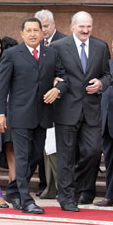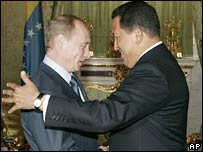"Revolution" as conceptual bulldozer
"If anyone forgets we're in the middle of a Revolution, we're going to beat it into them: this company stands with Chavez."
-Rafael Ramírez, PDVSA chairman and Minister of Energy and Mines
Quico says: More and more,
Rafael Ramírez's speech to PDVSA management has made me think about the way chavismo uses the word "revolution" to flatten the distinctions between state, government, homeland,
pueblo and leader - conceptual distinctions vital to a free society.
"Public employees are at the service of the State and not of any partiality," the constitution tells us. But a Revolution cannot think of itself as a "partiality" - it must think of itself as the quasi-mystical political incarnation of the people, its essence and its interests. The Revolution
is the state.
It makes no sense, within a revolutionary mindframe, to posit a distinction between Chavez's interests and the interests of the people, the homeland or the state: they're one and the same. In fact, that unity is what the word denotes, its deep meaning.
Which explains why chavistas, when they read Article 145, don't see what you or I see. They read the same words we read, but what they understand is different: "public employees are at the service of the Revolution and not of any partiality."
In a Revolution, state = government = homeland = people = leader. If you accept that, it follows that dissenting from the leader is tantamount to treason against the state. Once you've conflated these ideas into a single, undifferentiated soup, you pull out all the conceptual stops that restrain a government from tyranny. In this way, the word "Revolution" has become a trump-card, a conceptual bulldozer plowing over all spaces for legitimate dissent.

Ramirez is explicit about this: "we were put here by the Revolution, we were put here by the
pueblo, we were put here by President Chavez." You can't pick and choose between them, because they're basically the same thing - a kind of revolutionary Holy Trinity. There's no room in this vision for NiNis, for "light" supporters. To be "a little bit revolutionary" is to be a little bit of a traitor. It just won't do.
Anything short of total, unthinking support for the Revolution makes you an enemy of the people. Your conscience doesn't belong to you, it belongs to us...well, to him. And if you hold back, even a little, if you don't quite surrender your will in its entirety, you become suspect, an enemy to be liquidated.
It's a road that leads to tyranny, and nowhere else.
Please comment responsibly:
|
"The new PDVSA is red, very red, from top to bottom"
Quico says: Normally, I don't translate humor pieces - jokes so seldom make it unharmed from one language to the other. But it's a measure of how far gone the country is that even Laureano Marquez has stopped writing funny pieces. His front page editorial in yesterday's Tal Cual struck me as uncommonly eloquent, so here you have it...
Unlike most of you, I think the Minister of Energy and Mines is one of the few decent people who remain in the country. He doesn't go around spewing half-truths, fooling people. He tells it like it is, and that deserves respect, because it demands a kind of courage the rest of us don't have. Other public officials keep beating around the bush, trying to hang on to established norms and turning their discourse into a juggling act. Dr. Ramirez's sincerity deserves, at least, some appreciation.
"We've come here to talk about politics." Not about the company's policies, but about politics. About who you stand with, compañero.
If we get oil out of the ground or don't get oil out of the ground, that's not a problem the new PDVSA is much worried about. What matters is our absolute support for the candidate-president. The transcendent goals of the nation are none other than the will of its leader. My respects, Mister Minister. What's this I hear about having to apply this rule or that regulation? Straight up, clear as day, he said it: there is no regulation other than loyalty to the chief.
If something like this had been said before the Chavez era, all hell would've broken loose. But, for sure, nothing will happen. We're coming to grips with our national character. It's no joke that Venezuela has changed. It's become more honest about its dishonesty, more coherent with itself. Yup, I ignore the laws, I do whatever I feel like, so what? Isn't that our most authentic face?
Isn't that what we all do in the morning with the stoplight down the street?
"PDVSA is red, very red, from top to bottom." It's a crime to slow down people's political expression with the old wife's tale about how the company, since it belongs to the state, belongs to every citizen.
Oh no, this is our sandbox, it belongs to those of us who think in a certain way. The others don't count, they're enemies, people who sooner or later we shall have to exterminate in one way or another. Otherwise, it'll have to be like that crowd shown on State TV in Petare was chanting during one of the candidate-president's recent rallies: "oppositionists, leave." ("Los escuálidos que se vayan.") It's the same thing the minister says, drowned out by cheers, applause and "Uh-Ah"s...
"We shall not waver...we already tossed 19,500 enemies of the country out of this company." I personally know some of those enemies: they're people who thought that thinking, studying and training yourself might do you some good around here. Turns out they were wrong; the only thing that does you any good around here is supporting someone unconditionally, "or do you idiots (he didn't say the word, but you can intuit it) think you are here because you're smart, because you're capable?"
No. You are here because he put you here, just like he put me here, because he felt like it. Your will doesn't exist, your conscience belongs to us...well, to him. And they applaud...confirming.
This is all stuff you can understand the nice way, or you can get it beaten into you. And that goes for everyone. That's what I call an election campaign, minister, a good one! Not that mixed message about how we have to hate because we love, which people just can't wrap their minds around.
We have to hate because we hate, and obliterate the Other. The path followed by Pinochet, Fidel, Mao, Hitler, Stalin, Franco and so many others. The stadiums will come, sooner or later.
You have given us the true measure of what we're debating as we lead up to December 3rd, of the crossroads history has placed in front of us. Of course it's tough what you're saying. But it's honest. I don't know what the other enemies of the homeland think but I, at least, believe you.
Sobering stuff.
Please comment responsibly:
|
Can you spot the difference?
Quico says: Remember those "compare and contrast" essays they'd assign you to write in high school? Ah, the nostalgia! Here, lets do another one just for fun.
Compare and contrast:
 Item 1. Constitution of the Bolivarian Republic of Venezuela of 1999, Article 145:
Item 1. Constitution of the Bolivarian Republic of Venezuela of 1999, Article 145:Public employees are at the service of the State and not of any partiality. Their hiring and removal cannot be determined by political affiliations or orientations.
Item 2. Speech to PDVSA management by Rafael Ramirez, PDVSA chairman and Oil Minister:  I want our management to help us erase from our rules, from our internal communications, from any element that runs the company, anything that could cast doubt on our support for President Chavez. We have to say clearly...that the new PDVSA is red, very red, from top to bottom...
I want our management to help us erase from our rules, from our internal communications, from any element that runs the company, anything that could cast doubt on our support for President Chavez. We have to say clearly...that the new PDVSA is red, very red, from top to bottom...
You need to shake out of your heads the idea that anyone might sanction us, that anyone might criticize us if we express to our people that this is a company that supports President Chavez 100%...
It is a crime, a counterrevolutionary act, for any manager here to slow down our workers' political expression in support of President Chavez. Here, we back Chavez, he is our leader, the paramount leader of this revolution, and we will do whatever we have to do to support our president. Anyone who doesn't feel comfortable with that should yield his spot to a bolivariano...
We had to get rid of one guy, a man from our Operations Division, who allowed candidate Rosales to land and move around our company, "bloody hell, what's that about?" (coño pero ¿qué vaina es esa?) we said, "what is happening here? are they going crazy? are we really infiltrated by the enemies of the revolution?"
Let it be clear that we won't allow it, when we find out about that sort of thing we're going to liquidate it decisively.
It outrages me...to find out we have "NiNis" working here, "light" people working here, saying we need to open up to company. No way. If anyone forgets we're in the middle of a revolution, we're going to beat it into them: (se lo vamos a recordar a carajazos) this company stands with Chavez.
Please comment responsibly:
|
Keller's poll is not a voting intention poll
Quico says: Well, a kind soul leaked Keller's slides to me. As suspected, the 52-48 number is not the result of a standard, "if the election was today, who would you vote for?" type question.
What Keller does is segment the electorate according to their views on issues related to the government's line. This slide gives you a sense of the line of questioning he's using:
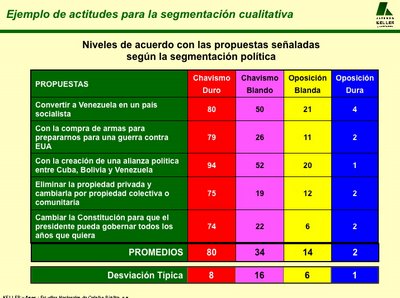
Based on the answers people give to these kinds of questions (e.g. "should Venezuela be made into a Socialist country? Should Venezuela strike an alliance with Cuba and Bolivia?) Keller assigns voters to one of four segments: hardcore chavista, softcore chavista, softcore opposition or hardcore opposition.
He finds that 22% of the electorate are "hardcore chavistas" and 30% are "softcore chavistas" - hence, he concludes 52% will vote for Chavez. And he finds 21% are "softcore opposition" and 27% are "hardcore opposition" and so he concludes 48% will vote against Chavez.
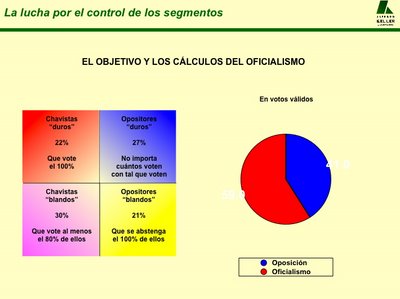
Thing is this is really a screwball, non-standard methodology. When you ask people the long-established voting intentions question ("if the election was today, who would you vote for?") you find that many people who Keller classifies as "softcore opposition" do not say they would vote for Rosales.
It's more realistic to think of that 48% as the universe of "persuadable, potential Rosales voters." It takes some bravado to just assume all of them will automatically line up behind Rosales.
The people Keller is tagging "softcore opposition" seem to be the people most other pollsters define as NiNis. It's far from certain they will end up voting for Rosales. In the end, what Keller shows is what all the other pollsters have been showing. About half the electorate will vote for Chavez, about 30% will vote for Rosales, and the rest are to-be-persuaded. The Josés of the world.
The overall story hasn't changed: Rosales has to sweep that "to-be-persuaded" demographic and win over a few softcore chavistas to have a chance. Keller's poll does nothing to persuade me he's getting there.
Please comment responsibly:
|
Is the CNE back where it belongs?
Katy says: One of the refreshing features of this electoral campaign has been that Venezuela's electoral authority (the CNE) has not been the center of discussion. Electoral conditions are undoubtedly improved from last December's elections; the infamous Jorge Rodríguez is no longer in the spotlight he so relished; and the opposition seems better organized to tackle with any eventualities that may occur.
Conditions are not ideal and problems persist (see
that other blog for a sample), but is it enough to claim that this election is completely unfair? It's unfair alright, but is it totally, over-the-top, Mugabe-like, Carrasquerically unfair?
Suppose Chávez wins in December and Manuel Rosales claims there was fraud. Will you believe him? There is one month left and nobody (not even Súmate) is making much noise about how adverse the conditions are this time around. Are we headed for a (gasp) somewhat fair electoral process?
Please comment responsibly:
|
The commentariat flips out!
Quico says: Just a note to those of you who read the main blog but skip the comments...
yesterday's thread in response to
JayDee's pulpero follow-up was one of the most heated and entertaining we've had in a long time. Tempers sort of flared, and Katy almost got a hernia erasing inappropriate stuff, but what was left behind strikes me as
really worth reading.ps: I've overhauled the comments' template. Tell me what you think...
Please comment responsibly:
|
Manuel who?
JayDee says:Finding myself in El Valle yesterday with little to do, I swung by
José’s bodega again for a beer.
Surprisingly, the man recognized me as soon as I walked in the door, even though it had been 4 months.
“You’re the journalist,” he said with a warm grin, handing me a Tercio before I had even asked for one.
The store was filled with the same variety of characters as before. Two men sat shirtless in the doorway, cradling empty bottles of Malta and smoking Belmonts. A women stood at the counter, awaiting her five slices of queso amarillo.
“When I was here last, we talked about Chávez and the elections, remember?”
He nodded, accepting the women’s money and turning his attention to me.
“Last time you said you would vote for anyone but Chávez. So, is it Rosales next month, then?”
Jose sighed and threw up his hands.
“I don’t know, I haven’t decided. I don’t even know who Rosales is. I might vote Chávez,” he answered.
“Really – That’s surprising,” I said. “What changed your mind?”
“I don’t think Chávez can loose, so it doesn’t really matter,” he continued, “But I am scared of what would happen if he lost. This area is pura Chavista, and I think there would be rioting and a lot of problems for my family, my store. Looting and violence and police and all sorts of stuff I don’t need. Besides, who is Rosales? I don’t know anything about him.”
I asked him if he was scared for his personal safety if he voted Rosales. Did he feel intimidated to vote Chávez?
“Not at all,” he said with a wave of the hand.
And criticizing Chávez to an international journalist?
“Tampoco, you can use my name in any report you want.”
“So what happened?” I pressed on. “Last we spoke, you were angry at the damage the Mercals have done to your business.”
“Oh, I still am,” he replied, “I don’t like how this government gives away everything for free. We are not instilling the people with a good work ethic in Venezuela. Everyone thinks they are automatically entitled to something without working, and that is the source of so much trouble.”
“Look, I like that Chávez wants to help the poor,” he continued. “But some of his ideas aren’t very well thought through.”
“Have you considered turning your bodega into a co-venture with Mercal?” I asked. “Wouldn’t that help you out?”
“Ahh the paperwork and the wait,” he sighed, rolling his eyes while handing me another beer.
“It takes forever, the bureaucracy. And the products are inferior quality. The rice and the pasta aren’t very good. But this is my store. I am 73 years old. I have been running this place myself for 30 years. Why should I be forced to suddenly take the government on as a partner in order to survive? I’d rather sell my beer and cigarettes.”
“And you don’t think Rosales would change things?” I tried one more time.
“You keep asking me about this Rosales guy,” he answered with a chuckle. “And I keep telling you; I don’t know him. I’ve never been to Zulia.”
Please comment responsibly:
|
Zogby goes down
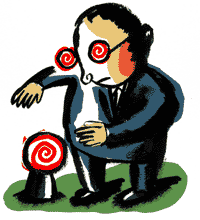 Katy says:
Katy says: Some of our loyal chavista readers are very upbeat on a recent poll by
Zogby International that gave Chávez a big, big lead over Rosales. An anonymous reader wrote something about this, and I have offered to post it.
Our reader says: "On August 21st of this year, forty days before Brazil's Presidential elections, Zogby International gave President and candidate for reelection Lula da Silva
a margin of 33 percentage points over his leading rival, social democrat Gerardo Alckim.
In essence, Zogby gave Lula 53% of the vote, and Alckim 20%. But the reality on the day of the vote was quite different:
Lula got 48.6% of the vote and Alckim got 41.6%.
Was Alckim able to mount a 22 percentage-point climb in preferences in less than six weeks, or was Zogby wrong in its analysis?
This question is important for Venezuelans, because a few days ago
Zogby unveiled the results of a poll done in Venezuela between Oct. 1 and Oct. 16, giving Pres. Chávez 59% of the vote, and unity candidate Manuel Rosales 24%.
It seems as though Zogby is wrong again, because the data underlying its poll puts their reliability in serious doubt.
In the Presidential election of 2000, 43.6% of voters abstained from voting. 32% of registered voters voted for Hugo Chávez, and 21.3% of them voted against him.
According to the underlying cross-tabulated data released by Zogby, of the 800 people they polled, 55.4% of them declared having voted for Chávez, 34.4% of them declare having abstained, and only 10.3% declare having voted against Chávez.
How can a poll presume to shed light on the political reality of the country, when the answers of the people polled are not representative of the Venezuelan electorate? How can Zogby release a poll without cross-checking their results with historical data?
And the worst part is...
Zogby says most Venezuelans live well!
68% of those polled say they are making enough money to ward off economic problems, while only 32% declare having at least some financial problems because of insufficient income.
This is an astonishing result given that the majority of the country is living in poverty.
We do not know who Zogby works for. We know "their" poll was subcontracted to
DATA Opinión Pública y Mercados, S.C., a Mexican firm, and that this firm hired a Venezuelan firm whose name has not been revealed.
Smells fishy, no? This is not the first time Zogby has screwed up. Slate also took a shot at debunking Zogby's prestige in
this terrific piece by Joshuah Micah Marshall. (Katy's note: the .gif image is from their piece)
The moral of this story is that elections are not won by polls, they are won by votes."
(PS from Katy: I apologize for not being able to link the article to the underlying Zogby data. If anyone would like a copy of Zogby's cross tabs, please email me. I'd be happy to send it to you as an attachment.)
Please comment responsibly:
|
Danilogate goes International
Quico says: Finally,
a high-profile foreign paper picks up on
the ongoing mystery of Danilo Anderson's murder. I'm so elated somebody cares, I'll let Diehl's couple of factual mistakes slide.
Please comment responsibly:
|
Rosales SUDANdo la gota gorda...
Quico says: This article in the New York Times more or less blew my mind:

To understand Sudan’s defiance toward the world, especially the Western world, check out the Ozone Café.
Here young, rich Sudanese, wearing ripped jeans and fancy gym shoes, sit outside licking scoops of ice cream as an outdoor air-conditioning system sprays a cooling veil of mist. Around the corner is a new BMW dealership unloading $165,000 cars.
“I tell people you only live this life once,” said Nada Gerais, a saleswoman.
While one of the world’s worst humanitarian crises continues some 600 miles away in Darfur, across Khartoum bridges are being built, office towers are popping up, supermarkets are opening and flatbed trucks hauling plasma TV’s fight their way through thickening traffic.
Despite the image of Sudan as a land of cracked earth and starving people, the economy is booming, with little help from the West. Oil has turned it into one of the fastest growing economies in Africa — if not the world — emboldening the nation’s already belligerent government and giving it the wherewithal to resist Western demands to end the conflict in Darfur.
Why do I bring it up? To underscore a couple of things.
First, how murderously easy it is for petrostates to finance a consumption boom in the middle of an oil bonanza. It really doesn't matter how criminal or incompetent the government is: even Sudan's modest 500,000 barrels/day are enough to finance a major economic boom when oil prices shoot up. You don't need a coherent development strategy, an actual plan for the future, or even a minimally functioning institutional system...all you need is oil.
Second, just how much petrostates can get away with when oil is in short supply. So long as oil is scarce, there's virtually no limit to what the international community will overlook in its thirst for it. We think the Tascon List is going to spark international outrage? These people are orchestrating a no-kidding genocide, and the international community still queue up to line their pockets. Let the good times roll.
Things for Rosalistas to ponder. A perfect candidate running a perfect campaign would still have a hard time beating Chavez in the middle of an oil boom. And what we have is far from a perfect candidate and far from a perfect campaign.
Please comment responsibly:
|
 Ramirez is explicit about this: "we were put here by the Revolution, we were put here by the pueblo, we were put here by President Chavez." You can't pick and choose between them, because they're basically the same thing - a kind of revolutionary Holy Trinity. There's no room in this vision for NiNis, for "light" supporters. To be "a little bit revolutionary" is to be a little bit of a traitor. It just won't do.
Ramirez is explicit about this: "we were put here by the Revolution, we were put here by the pueblo, we were put here by President Chavez." You can't pick and choose between them, because they're basically the same thing - a kind of revolutionary Holy Trinity. There's no room in this vision for NiNis, for "light" supporters. To be "a little bit revolutionary" is to be a little bit of a traitor. It just won't do.







 Chavez Reelection Blog: Katy documents the government's use of public resources for Chavez's partisan advantage.
Chavez Reelection Blog: Katy documents the government's use of public resources for Chavez's partisan advantage.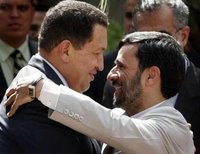

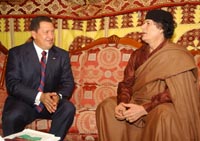
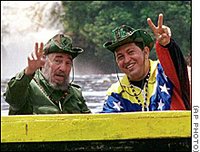
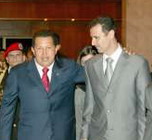
 Site feed
Site feed 